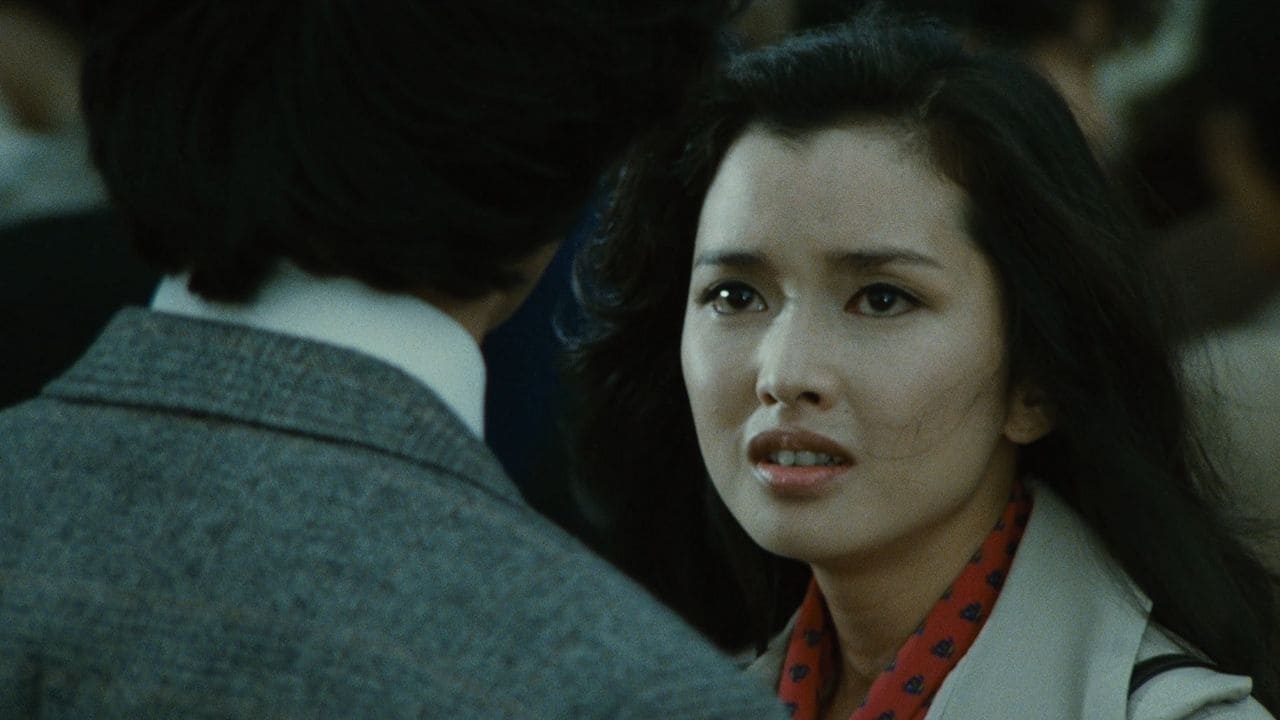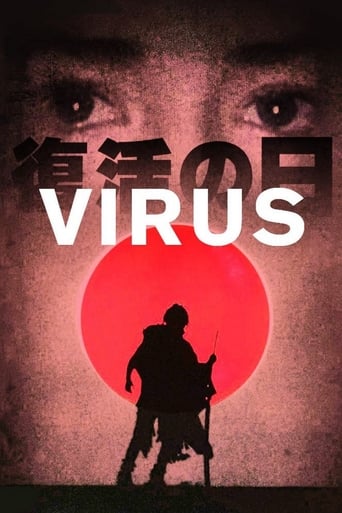



Very Cool!!!
Overrated
Excellent, smart action film.
Story: It's very simple but honestly that is fine.
This film centers on a virus that is made by the American military and then stolen by the East Germans. On the flight from East Germany to Zurich the plane crashes which releases the virus into the atmosphere resulting in a devastating world-wild contagion. Although incredibly deadly the virus has one major flaw in that it goes dormant in freezing conditions. As a result, the people living in Antarctica are saved from its contamination provided they don't allow any infected people from the outside world in. So over 850 men and 8 women are essentially cut off from everybody else. At any rate, this is a decent post-apocalyptic film with an all-star cast. Unfortunately, except for a very few actors, none of them had the allocated screen time to really establish themselves and develop their characters. This gave the film a "paint-by-numbers" feel which I thought damaged the overall effect. Additionally, from what I understand there is a long version of this movie available which is supposedly much better than the shorter version I happened to view. If that is the case then that probably explains some of the scenes which looked like they had been cut which contributed to the choppy effect I described earlier. In any case, while the 108 minute version is okay it might be better to obtain the longer version if possible--if for no other reason than the fact that the story might flow a bit more smoothly and the actors can showcase their talents a bit more.
View MoreI played a Russian army officer. I remember the director chewing me out in Japanese and with animated gestures, because I was not standing with as rigid and military a posture as was expected of an army officer. I was on set with many of the lead actors: Chuck Connors, well past his "Rifleman" days, quipped between takes: "Not bad for fourteen grand a day." Bo Svenson: He carried a whoopie cushion and sidled up to people, making fart sounds, which he thought was hilarious. He also took a lot of pride in showing us his underwater demolition license. George Kennedy: Self-absorbed, sullen and forbidding, spoke with no one. Those three were all really big, tall men. Edward J. Olmos: Nice guy, friendly, engaging. Cec LInder: Liked to play poker between scenes. A very elegant gentleman, exuded mentshlekhkayt. Olivia Hussey: Stayed in her dressing room most of the time, listening to Bob Dylan on a cassette-player. One time, she made her way to the set to watch a scene being filmed and said "hello." She was a breathtakingly beautiful woman, famous for being in Zefirelli's "Romeo and Juliet." This, I'll never forget ( and no disrespect intended): Local Toronto actor Ara Hovanessian was cast in a small part. He had a dressing room with his name written on a piece of paper tacked to the door. Figuring it would be a positive career move -???- he tore off the "essian," and re-named himself there and then. I can still that crudely ripped piece of paper in my mind. Ah, show-business . . .Wolf Krakowski Kame'a Media: www.kamea.com
View MoreIf I recall my childhood correctly, "Virus" got ample play on Saturday-afternoon television, and a scene of a military man with metal protruding from his chest has always stuck with me. So, imagine my delight when, probably more than 15 years later, I got a chance to finally view the film again. But this is problematic, since the version I watched was the 103-minute U.S. cut (the scene I remember remained intact, albeit less impressive now). In any case, "Virus" is a pretty good apocalyptic thriller--the opening 30 minutes in Washington, DC were especially gripping, and the subsequent action at an Antarctic outpost (where remaining world officials are holing up) was fittingly bleak (not to mention talky at times). The film contains an impressive cast of pseudo-familiar faces (Glenn Ford, George Kennedy, Chuck Connors, Olivia Hussey, etc.) that sell the story due to their 'every(wo)man' appearance. While the plot occasionally trots out sci-fi gimmickry (last-minute plague vaccinations), the grim imagery matched with a taut story make "Virus" a fine--if very downbeat--end-of-civilization fable.
View MoreUnquestionably the end-of-the-world as beget by a lethal, unstoppably infectious man-made disease cataclysmic sci-fi thriller to end 'em all, an unmitigated take-no-prisoners-and-don't-pull-any-punches corker which at the time was the single most costly (a hefty $17 million), audacious and prodigiously ambitious shoot-the-fireworks-straight-to-the-moon-and-back film production made in Japanese motion picture history, a grand scale endeavor which took two whole years and the participation of five entire continents to get made. Naturally, and somewhat ironically considering the all-star international name cast, this hell-broke-for-humanity merciless skull-popper received short shift in the United States, forgoing a theatrical run for the undeserved direct to cable and video route. To make matters worse, this two and a half hour epic was badly butchered by American distributors, who cut roughly 45 minutes out of the film.A plane crash in the Alps gets the grimly serious plot ball rolling with an electrifying bang, unleashing the East German conceived MM-88 virus, a highly dangerous, contagious and impossible to curtail mutant DNA strain designed for chemical warfare purposes which both mimics the symptoms and exacerbates the severity of other more common and controllable sicknesses. Pretty soon all of 863 people are left of the world's once teeming, now quickly dwindling population, specifically 855 males and just eight females. It's up to this barely hanging on by a thin, flimsy, easily breakable thread bunch, who are valiantly eking out a tough, exacting, human spirit-testing existence in the freezing Artic because the virus can't take effect in 10 below chilling cold weather, to put things back together by starting afresh from the ground up. Alas, there's still a dire threat to be found from a fully operative doomsday device activated by a hawkish US general (ripely overplayed to the fire-breathing hilt by Henry Silva), which will be set off by an impending earthquake and destroy the few remnants of human life on this planet in an infernal blaze of nuclear holocaust glory unless it's shut off in time.Director Kinji Fukasaku, who also graced us with "The Green Slime," "Message from Space," and both "Battle Royale" films, builds on the heart-crushingly grave, uncompromisingly dark and downbeat tone with terrifyingly effective results, skillfully creating and sustaining a fiercely dour, distressing and disturbing all-hope-is-lost sensibility that's equally fatalistic and nihilistic in its depressing implications on mankind's self-destructive warmonger nature and desperate desire to keep on going in the absolute worst of situations. Sundry secondary characters are randomly dispatched like so many dominoes that have been lined up just so they can be knocked down (the little boy who commits suicide over a CB radio when he can't find anyone to talk to is an especially devastating sequence), hospitals overflow with dying patients, martial law gets declared all over the world, decomposing corpses litter the streets, and the few triumphs made by the struggling against savagely punishing odds ragtag group of folks who are still alive and kicking are very bittersweet hard-won victories indeed. The performances are uniformly superlative: Glenn Ford as the stalwart, pragmatic president, Robert Vaughn as a regretful senator, Chuck Connors as a steely, intrepid British naval submarine captain, Olivia Hussey as a resilient pregnant woman, Sonny Chiba as a South Pole base commander, Bo Svenson and Masao Kusakari as a dynamic pair of mighty fighting men who go into action to prevent a second catastrophe, Cecil Linder as a diligent doctor, Edward James Olmos as a hot-tempered Latino country leader, and George Kennedy as the fatherly admiral in charge of the Artic base all essay their roles with laudable conviction. Teo Macero's gorgeously elegiac orchestral score, Daisaku Kimura's agile, crystalline cinematography (the sweeping panoramic shots of the wintry, desolate, godforsaken Artic terrain are breathtaking), and a hauntingly bummed-out ending further enhance this hard-hitting knockout.
View More